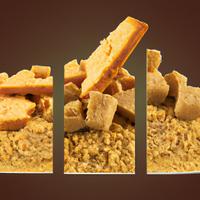
1 serving (30 grams) contains 135 calories, 1.5 grams of protein, 4.5 grams of fat, and 21.0 grams of carbohydrates.

Log this food in SnapCalorie

Nutrition Information
Calories |
675 | ||
|---|---|---|---|
% Daily Value* |
|||
| Total Fat | 22.5 g | 28% | |
| Saturated Fat | 7.5 g | 37% | |
| Polyunsaturated Fat | 0 g | ||
| Cholesterol | 0 mg | 0% | |
| Sodium | 450 mg | 19% | |
| Total Carbohydrates | 105 g | 38% | |
| Dietary Fiber | 3 g | 10% | |
| Sugars | 37.5 g | ||
| protein | 7.5 g | 15% | |
| Vitamin D | 0 mcg | 0% | |
| Calcium | 30 mg | 2% | |
| Iron | 1.5 mg | 8% | |
| Potassium | 75 mg | 1% | |
* Percent Daily Values are based on a 2,000 calorie diet. Your daily values may be higher or lower depending on your calorie needs.
Food Attributes
Source of Calories
About Crushed biscuits
Crushed biscuits are finely broken or ground pieces of baked cookies or crackers, commonly used as an ingredient in desserts and baked goods. Originating from various cuisines, their flavors and textures depend on the base biscuit used, which may range from sweet digestives to buttery shortbread or spiced ginger snaps. Primarily composed of wheat flour, sugar, fats, and flavorings, they serve as versatile bases for recipes like cheesecakes, pie crusts, or layered puddings. While crushed biscuits provide a convenient and flavorful foundation, they are often high in refined sugars and saturated fats, making them energy-dense and best enjoyed in moderation. On the positive side, some varieties may contain whole grains or lesser amounts of added sugar, offering slightly better nutritional value. Incorporating them into recipes can add delightful texture and flavor, but balancing them with nutrient-rich ingredients is recommended for a healthier approach.



